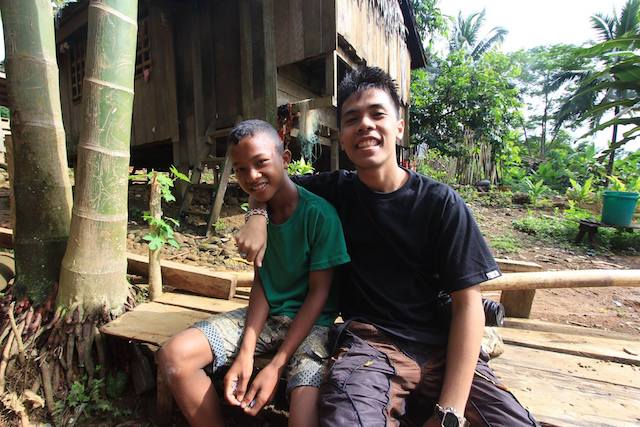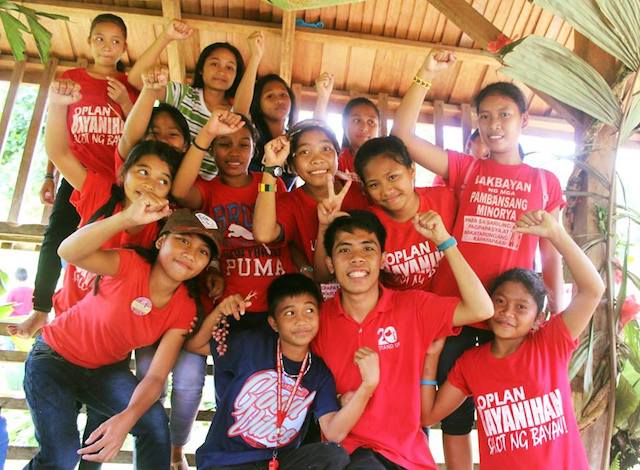
MANILA, Philippines – He could have worked in a multinational company. In fact, the 23-year-old computer science graduate has already received numerous job offers upon graduation due to the recognition his undergraduate thesis has received in international conferences. But despite these opportunities, Chad Errol Booc, chose to lead a simpler life.
But more than that, he chose to “serve the people,” as he said.
"Marami talagang tao ang underserved. Maraming tao ang hindi nakakaramdam ng social services ng ating bansa- 'yong mga taong dinidiscriminate pa din hanggang ngayon."
(There are a lot of underserved people. There are many Filipinos who do not receive social services- people who are being discriminated up until now)
As a University of the Philippines graduate, Booc has been familiar with the motto of giving back to the Filipino people. His way of doing so is by volunteering as a Math and Science teacher at the Alternative Learning Center for Agricultural and Livelihood Development (ALCADEV) in Lianga, Surigao del Sur.
ALCADEV is an alternative learning system that was established on July 19, 2004. It is designed to provide secondary education to indigenous people particularly the Manobo , Higaonon, Banwaon, Talaandig and Mamanwa in Surigao del Norte and del Sur and Agusan del Norte and del Sur.
Booc has been teaching Manobo students for almost a year now.
"Na-concretize din 'yong motto na 'serve the people' kasi sila talaga 'yong dapat nating paglingkuran."
(The motto “serve the people” was concretized. These are the people who we should really serve)
Discovering his calling
Before the Manilakbayan in 2015, Booc did not know about the struggles the Lumad communities were facing.
"No'ng October, dumating 'yong Lakbayan tapos doon ko naintindihan kung ano talaga 'yong issue nila. Marami akong naka kwentuhan sa mga Lumad. Nalaman ko kung ano 'yong mga pinagdadaanan nila- 'yong mga pinapatay na Lumad leaders, pati teachers."
(In October, Lakbayan came and I understood their issues from there. I was able to talk to a lot of Lumad. I found out what they were going through including the killings of Lumad leaders and teachers.)
After the 2016 Manilakbayan, Booc went to Surigao del Sur together with the community.
He said he was inspired by the free education system of the Lumad – something difficult to achieve in urban areas. The computer science graduate also became motivated to volunteer as a teacher when he found out the students needed one.
"Nakita ko rin 'yong pangangailangan nila ng mas maraming volunteer teachers. No'ng time na 'yon, nagkaroon na ng direksyon 'yong buhay ko. Nakita ko na 'yong sarili ko sa gano'ng field."
(I saw their need for more volunteer teachers. During that time, my life started to have direction. I saw myself in that field.)
Booc narrated the life they have in the mountains. He said they had a simple and fulfilling life before martial law came.

The impacts of martial law
Booc thought it was going to be smooth. He said he did not feel the initial effects of martial law when it was declared. But as time went by, its horrors started creeping in.
One major change they had to experience was the checkpoints. According to him, the problem with this is that the military are asking for identification cards. Majority of indigenous people do not have one because this is an almost foreign concept to them.
“Dahil doon, natatakot na silang bumaba ng bundok.”
(Because of that (checkpoints), they became scared of going down the mountains.)
Early July, he said they started to see military men roaming around their community. On July 6, bomber planes started to fly around their area at dawn. People panicked.
"Sobrang nakakatakot. 'yong mga tao nag iiyakan,” Booc said.
(It was so scary. People were crying.)
Because of this incident, a total of 2,000 of them evacuated to nearby areas to escape militarization in their community.
The threat of President Rodrigo Duterte bombing the Lumad schools did not help at all. Despite the Armed Forces of the Philippines saying that it was a figure of speech by the president, Booc said it will still have a major impact on Lumad communities. (READ: Military won’t bomb Lumad schools- AFP)
"Hindi siya figure of speech lang. Nangyayari kasi talaga sa kanila- siinusunog 'yong school. Pinapatay 'yong leaders. Kaya hindi malayong mangyari sa kanila."
(That was not just a figure of speech. It really happens to them – their schools are really being burned down. Their leaders are getting killed. That is not far from happening to them.)
In 2015, an ALCADEV campus in Agusan del Sur was burned down. In the same year, ALCADEV executive director Emerico Samarca, tribal leader Dionel Campos and his cousin Aurelio SInzo, were killed in what was known to be the Lianga massacre.
Booc said that the military keeps on red-tagging the tribal leaders and volunteer teachers. But they could not find a link between them and the New People’s Army (NPA), and the Communist Party of the Philippines (CPP), according to him.
"Pilit nilang hinahanapan ng links with the NPA, the CPP. Wala silang makita."
(They keep on looking for links with the NPA, the CPP, but they couldn’t find any.)
Booc may be courageous enough to answer the call of teaching the Manobo children in Mindanao despite the situation they are in. But like everyone else, he has his fears for his own safety. That is why he prays for nothing but peace to come and for them to go back to their normal lives – to their simple yet fulfilling lives. – Rappler.com